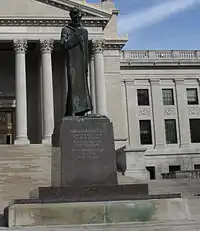
.jpg.webp)
"Abraham Lincoln Walks at Midnight" is a 1914 poem by American poet Vachel Lindsay. It portrays Abraham Lincoln walking the streets of Springfield, Illinois, stirred from his eternal sleep, a man, who even in death, is burdened by the tragedies of the modern world. At the time the poem was written, Lindsay was depressed by knowledge of the blood and death exacted by World War I.
The poem was included in Louis Untermeyer's anthology, Modern American Poetry, published in 1919 (see 1919 in poetry).[1] This poem is now used in many schools and districts as an inspirational figure of the Civil War, as well as United States history.
Settings
In 1953 composer Roy Harris wrote a chamber cantata based upon this poem, scored for mezzo-soprano, violin, cello, and piano.[2] Three settings by African American composer Florence Price were rediscovered in 2009 (a setting for orchestra, organ, chorus, and soloists, premiered on April 12, 2019 by the Du Bois Orchestra and Lyricora Chamber Choir in Cambridge, Massachusetts; a setting for chorus, soloists, and piano, premiered on May 4, 2019 by the Andover Choral Society, North Andover, Massachusetts; and a setting of the Introduction and part of the Overture for very large orchestra).[3]
See also
References
- ↑ Web page titled "Modern American Poetry/Edited by Louis Untermeyer", (with related pages giving the full content of the volume) at Bartleby.com website, retrieved February 21, 2010
- ↑ "Abraham Lincoln walks at midnight; a cantata of lamentation for mezzo-soprano, violin, cello, and piano". 1 January 1962. Retrieved 18 December 2016 – via Hathi Trust.
- ↑ Julie Anne Sadie; Rhian Samuel (1994). The Norton/Grove Dictionary of Women Composers. W.W. Norton. pp. 375–. ISBN 978-0-393-03487-5.
External links